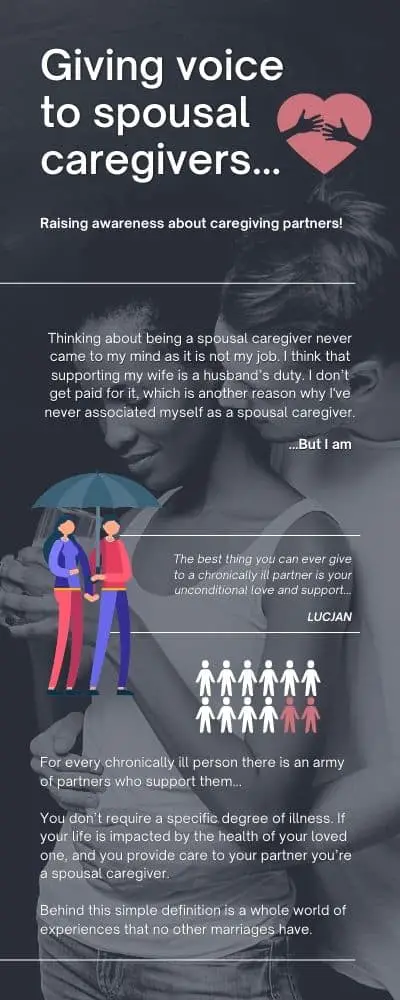Giving voice to spousal caregivers. Raising awareness about caregiving partners.
Why giving voice to spousal caregivers is important?
There is a ton of blogs on chronic illness written by those who suffer, but why nobody talks about the ones who support them? This is why giving voice to spousal caregivers became my way of life.
I decided to start a blog about endometriosis and fibromyalgia with a difference – to show the perspective of those who are always forgotten – caregiving partners.
Being chronically ill is incredibly hard, but being a supportive partner can be challenging for us due to the lack of understanding of what we are going through.
When you type into Google “chronic illness”, at the top you get a lot of medical information on chronic conditions, when you scroll down, you find a lot of information on how to cope.
All of these articles are written by experts in the medical field or by chronically ill people for chronically ill people, giving advice on how to cope with chronic pain, emotional and mental impact of a particular chronic disease.
But where is the information about caregiving partners? They aren’t there, they are forgotten.
I run my Worry Head blog to raise awareness about endometriosis and fibromyalgia based on my own personal experience I gathered for over a decade.
However…
By giving voice to spousal caregivers I needed to understand first if I was one. I wondered, am I a spousal caregiver or am I just a husband?

Am I a spousal caregiver?
Thinking about being a spousal caregiver never came to my mind as it is not my job. I think that supporting my wife is a husband’s duty. I don’t get paid for it, which is another reason why I never associated myself with being a spousal caregiver.
But I had a meeting with my employer and one of the nurses from my caregiving company who explained to me why I am a spousal caregiver.
I work as a carer for disabled young people, when I come home, sometimes my wife needs my help, especially when she has bad flare-ups from either endometriosis or fibromyalgia pain.
There are times when she’s in so much pain she can barely move, let alone function. In situations like that, I take a day off work, often even more.
The nurse from my company was a person who noticed that I became overwhelmed and offered me help.
She said that I am a 24/7 caregiver, I’m a carer for disabled young adults, but after work, I’m a carer for my wife.
It doesn’t matter that I get paid for caregiving at work and get no penny for looking after my wife. The same applies if you care for your spouse.
If you are married to or a partner of someone with a chronic illness then you are a spousal caregiver.
You don’t require a specific degree of illness. If your life is impacted by the health of your loved one, and you provide care to your partner you’re a spousal caregiver.
Behind this simple definition is a whole world of experiences that no other marriages have.
In sickness and in health!
Giving voice to spousal caregivers is difficult for one main reason, the focus is always placed on chronically ill people, not those who share their lives with them.
As a professional caregiver at work, I never have a lunch break. My client is extremely complex. I have to keep a close eye on him all the time. I can only eat whenever I grab a minute. It’s hard.
Saying that my personal experience at home is challenging despite my wife taking good care of her own needs most of the time.
She isn’t bed-bound, she also can do some chores by herself. Sometimes, however, trying to complete a simple task whilst staying well is a full-time job.
My wife has advanced stage IV deep infiltrating endometriosis and fibromyalgia disorder.
Both illnesses cause pain and flare-ups of other symptoms that are unpredictable. The very fact is distressing enough.
The impact of her physical and mental state is really exhausting not only for her, but it also impacts my own emotional state too.
Endometriosis and fibromyalgia cause general anxiety and depression, but my wife developed an Obsessive-Compulsive Disorder after she got an infection at the hospital after her laparoscopic surgery for endometriosis.
OCD on its own can destroy a relationship. But suffering additionally from anxiety, depression, and chronic pain seems impossible to manage in a marriage.
Many times I fell flat on my face because I did not know how to help my wife. But I always got up and carried on.
I swore to myself that I am going to take care of my wife after one of the most difficult times she has gone through trying to commit suicide. In sickness and health, for better or worse, always!

Giving voice to spousal caregivers…
Worry Head is about giving voice to spousal caregivers, and here’s why…
Even though living with multimorbidity brings a lot of problems for the ill spouse, it also takes hold of their spousal caregiver.
We struggle to cope with the amount of many emergency situations and hospitalizations for our ill partners.
Male partners also feel like they are a partner without a woman, as the intimacy disappears, especially when she has endometriosis causes sex to be extremely painful and also impacts on female fertility.
The once-shared tasks of daily life fall onto one partner.
Battles over medical bills and struggles with other payments cause financial issues and anxiety.
Some partners become sole breadwinners and often live on a reduced income. Trying to care for an ill partner, emotionally and financially results in financial stress.
The “new normal” becomes an “elephant in the room”. The caregiver feels alone as their partner’s health is meant to take priority and this is why we feel forgotten.
We can’t easily talk to our ill partners about how their situation makes us feel because they don’t understand our situation in the same way we don’t understand what they are going through.
We’re afraid to express what we feel because it may upset our partners, and even though we don’t blame them for anything, they feel like a burden to us already.
Caregivers feel that their whole life is circled around their spouse’s illness, even though we feel love and want to help our ill spouse, it’s just how it feels.
We always hear phrases such as “how’s your ill partner” and rarely “how are you”. We seem to be ignored, overlooked, marginalized, and even forgotten.
Chronic illness and marriage.
Disease and pain will cause stress and strain on every relationship, and marriages belong to that equation.
There is a much higher rate of divorce amongst couples with endometriosis and fibromyalgia. I wrote about it in two separate posts:
Such chronic conditions not only break couples but can also offer opportunities for tremendous growth in the relationship.
When illness occurs, you will naturally focus your attention on your partner because an illness lessens their coping skills, and the weaknesses of your spouse become more noticeable.
Your partner may feel more alone whilst you, who are more independent, may feel increasingly isolated.
Naturally, we excuse these behaviors because of the illness, however, this is very easy in short-term illnesses where the recovery is quick.
When it comes to chronic illness, for which the diagnosis isn’t straightforward, this is not the case. When there is trouble getting a diagnosis, or it’s difficult to understand, the behaviors of the sick person can seem a bit unacceptable.
Relationships that are already weak are the most vulnerable to the strains and the divorce rate is much higher than that of the healthy couples.
When partners lack communication skills, they are quick to accuse one another and are slow to forgive.
Chronic illness can cause damage to marriages.
What can you do?
There is one thing that you can do as the one who cares for the ill, instead of trying to fix your partner’s illness, which you can’t do, try to change your approach and adjust to your loved one’s new life.
You can do it by:
- Learning about your partner’s illness.
- Openly and honestly listening to them.
- Accompany his/her appointments.
- Communicate instead of looking for faults.
- Focus on your own health, set boundaries.
The chronically ill spouse can:
- Listen to caring partner’s needs.
- Allow them free time to recharge.
- Give time to adjust.
- Try not to overwhelm them with tasks.
- Not blame them for making mistakes.
Endometriosis and fibromyalgia are complex, challenging diseases for everyone involved. Not only for those who suffer but also for the caregiver.
Giving voice to spousal caregivers is hard but the ill person must do their best to give them at least that.
Spousal caregivers to people with chronic pain must learn to navigate a new world of illness, quite often without the guidance of doctors. Doctors don’t know them as well as their spouses.
Be mindful of that. Love one another, and don’t forget to listen and communicate. You will overcome any challenges doing so.
Take good care of each other and see you soon!


About Me
Hi, I’m Lucjan! The reason why I decided to create this blog was my beautiful wife, who experienced a lot of pain in life, but also the lack of information about endometriosis and fibromyalgia for men…
